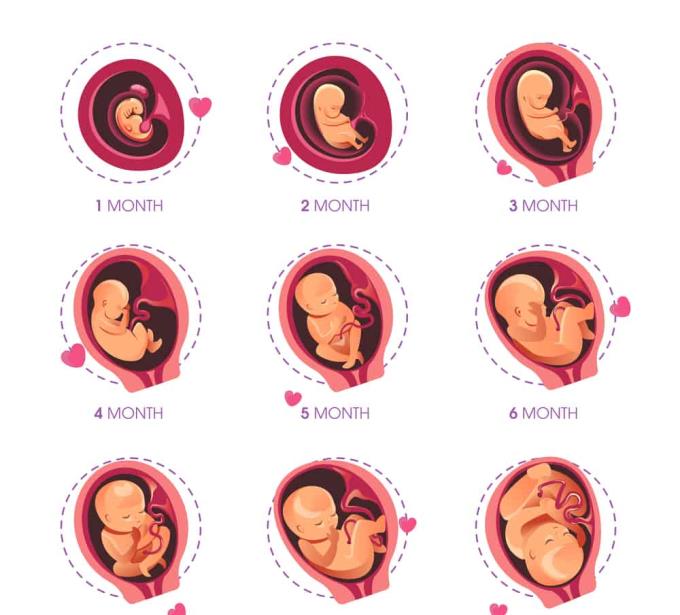You are pregnant and worry about whether your baby is developing well or not? The chart of fetal weight by week of age will provide useful information for pregnant mothers to take better care of themselves, helping mothers and babies stay healthy.
As a separate individual, each fetus will have a different growth rate. The average weight of the fetus at full term is usually 3.5 kg and the average length is about 51.2 cm (from head to toe). Therefore, standard length and weight levels are given to assess whether pregnancy is developing well.
How to measure the length and weight of the fetus by week of age
Did pregnant mothers know that the standard length and weight of the fetus by week of age was measured in different ways? Measurements specifically for each stage of gestation are as follows:
From 8 - 19 weeks, the baby is measured from head to bottom: At this time, the baby's legs are bent in the fetus during the first half of pregnancy, so it is difficult to accurately measure the baby's weight and length. This measured length is called the buttock length.
From 20 to 42 weeks, the baby's length is measured from head to heel: During this time, the size and weight of the fetus will gradually increase.
From the 32nd week, the baby's weight will be maximized, the baby's final lines will be completed.
Table of height, weight of the fetus standard by week
Table of height and weight of fetus according to research of WHO (The World Health Organization) - World Health Organization:
Age of fetus Length (cm) Weight (grams)
Week 81.61
Week 92.32
Week 103.14
Week 114.17
Week 125,414
Week 137,423
Week 148,743
Week 1510,170
Week 1611,6100
Week 1713140
Week 1814,2190
Week 1915,3240
Week 2025,6300
Week 2126,7360
Week 2227.8430
Week 2328,9500
Week 2430600
Week 2534,6660
Week 2635,6760
Week 2736,6875
Week 2837.61.000
Week 2938,61,100
Week 3039,91,300
Week 3141,11,500
Week 3242,41,700
Week 3343,71,900
Week 34452.100
Week 3546,22,400
Week 3647,42,600
Week 3748,62,900
Week 3849.83,000
Week 3950,73,300
Week 4051,23,500
Week 4151.53,600
Week 4251,73,700
Please compare the baby's indicators on the ultrasound chart with the data above to check if your baby is growing well or not. But do not worry too much if the results show that your baby is much smaller or larger than the weight of the fetus. Your doctor will tell you when to be concerned about your baby's weight because as mentioned above because fetal development depends on many factors.
6 factors affect the weight of the fetus

Fetal weight can be influenced by many different factors, however, these are the most important factors that can directly affect your baby's development:
Genetic factors.
Your own health: If you have diabetes, being obese is more likely to have a big, heavier baby than normal pregnant women.
Your physique, body: Most mothers with a tall stature often give birth to babies that are heavier and longer than other mothers.
Weight gain during pregnancy: If you gain too little weight or don't gain weight, the fetus can be underweight, malnourished. Conversely, if you gain too much weight, your baby may grow beyond standards, putting you at risk of having a cesarean section.
Usually the second child is usually larger than the first. But if the distance between the births is too close, the second child can also be underweight.
Number of fetuses: If you have twins or multiple pregnancies, the weight of each baby is lower than the standard fetal weight chart.
Abnormal development of fetal weight for gestational age
Be aware that even in early pregnancy, fetal development is not the same. Therefore, the figures in the height and weight of the fetus above are for reference only. Sometimes the weight of the fetus is lower than or approximately the standard weight so pregnant women do not worry too much. What you need to do in this case is to eat a reasonable and nutritious diet, get adequate rest, avoid stress, and follow your doctor's instructions.
The fetus is more developed than gestational age
If after an ultrasound, your doctor tells you that your baby has a measured length of about 3cm longer than normal, which means he is getting older than gestational age. Did you know that a pregnancy that is too large can make it difficult for you to deliver and have a baby?
In addition, the fetus is older than gestational age is also a sign that the baby may be at risk of some diseases such as diabetes, obesity, digestive tract diseases, cancer risk ...
Therefore, in this case, your doctor will order you to do a few tests to check for the cause for proper adjustment.
The fetus is developing poorly for gestational age
If on the ultrasound results, compared with the weight table the baby has a length 3 cm shorter than the average length, that is, the baby is showing signs of underdevelopment. The fact that the fetus is too small compared to the standard will make the baby at birth risk of malnutrition, poor resistance, and susceptibility to diseases, making health not guaranteed.
Your doctor will order you to do some tests to find the cause. You may have to do a placenta function test so the doctor can evaluate whether the placenta is transporting adequate nutrients to the fetus, checking if the umbilical cord is abnormal.
At the same time, the doctor will ask you carefully to know whether your diet ensures the development of the fetus or has problems that adversely affect mental health or not. Once you've identified the cause, your doctor will guide you on appropriate adjustments, such as changing your diet, rest and relaxation.
The role of fetal weight monitoring

During pregnancy, the health of mother and baby comes first. However, because of fear that the baby is not growing well, families and mothers often tend to over-nourish, causing mothers to gain uncontrollably gain weight. This seriously affects both mother and fetus during birth and future development of the baby.
In addition, during pregnancy, some pregnant mothers often have feelings of anorexia, morning sickness, and the body does not have enough nutrients to nourish the fetus.
Monitoring fetal weight is extremely important to help mothers feel secure, understand the development of the baby and have a reasonable diet and exercise during pregnancy, while helping the fetus to be healthy. Better brain and physical development both help stabilize the mother's health, avoid dangerous complications during childbirth .
How does weight of pregnant mother affect fetal health?
During pregnancy, the weight of the pregnant mother must also be paid attention to. According to some studies , the mother's weight greatly affects the weight and length growth of the fetus.
If you gain too much weight, you have a high risk of gestational diabetes , and your chance of having a C-section is very high because the pregnancy is too big. Conversely, too little weight gain can cause the fetus to not have the nutrients needed for development and can easily lead to preterm birth.
Therefore, pregnant women should have appropriate nutrition for the healthy development of the fetus and make it easier to give birth. In addition to following a reasonable diet, if there are no abnormalities to limit exercise, you should exercise 30 minutes / day to have a healthy pregnancy.
During pregnancy, you should only gain between 10 - 12 kg. If you have multiple pregnancies, you can gain about 16 - 20 kg.
In the first 3 months of pregnancy, your weight should only increase no more than 1.5-2kg. But if your doctor warns you that you are underweight, you must add more than 2 kg. If you are overweight, during the first 3 months of pregnancy, you may not need to gain weight or gain no more than 1 kg.
Pregnancy period from 14 to 28 weeks, you can gain about 0.5 kg per week, but if you are overweight you should only limit the weight increase by about 0.2 to 0.3 kg / week.
In particular, another study found that growth in fetal weight was to some extent influenced by mother's age, height, weight, and degree of sexual intercourse.
aFamilyToday Health does not offer medical advice, diagnosis or treatment.













